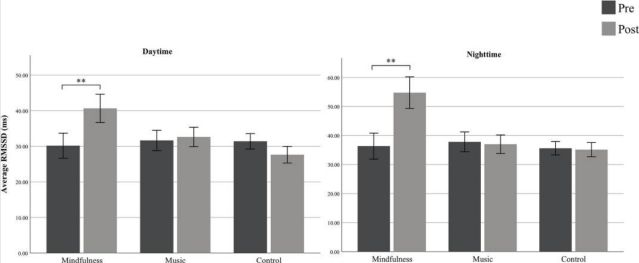Have you ever wondered if mindfulness meditation could genuinely affect your body’s physiological responses, particularly your heart rate variability (HRV)? This article delves into whether practicing mindfulness meditation can increase HRV, thus contributing to better cardiovascular health and overall well-being.
Understanding Heart Rate Variability (HRV)
Heart Rate Variability (HRV) refers to the variation in time intervals between heartbeats. It is a measure of the autonomic nervous system’s (ANS) flexibility and adaptability. A higher HRV generally indicates a robust parasympathetic (rest-and-digest) response, whereas a lower HRV often points to a dominant sympathetic (fight-or-flight) response.
The Role of the Autonomic Nervous System
The autonomic nervous system has two main branches: the sympathetic and parasympathetic systems. The sympathetic system prepares the body for intense physical activity, while the parasympathetic system conserves energy and helps in recovery. HRV increases when parasympathetic activity is dominant and decreases when sympathetic activity takes over.
Measuring HRV
HRV can be assessed through various indexes:
- RMSSD (Root Mean Square of Successive Differences): Reflects short-term variations and is primarily influenced by parasympathetic activity.
- HF-HRV (High-Frequency component of HRV): Associated with respiratory sinus arrhythmia and parasympathetic activity.
- LF/HF Ratio (Low-Frequency to High-Frequency Ratio): Indicates the balance between sympathetic and parasympathetic activities.

Mindfulness Meditation and HRV
What is Mindfulness Meditation?
Mindfulness meditation involves maintaining a non-judgmental, focused awareness of the present moment. Practitioners frequently refocus their attention whenever distractions arise, which theoretically enhances cognitive function and reduces stress levels.
Study Design and Hypotheses
To uncover the effects of mindfulness on HRV, researchers conducted a study using the Headspace app. They divided participants into three groups: a mindfulness meditation group, an active music listening control group, and a non-intervention control group. Here were the main hypotheses:
- Mindfulness would increase daytime HRV after the intervention.
- HRV would rise over the 10-day practice period.
- Mindfulness would reduce respiratory rate in the acute phase only.
- HRV would increase during sleep following the intervention.
Participant Allocation and Methodology
The study included 90 participants, randomly assigned to one of the three groups. Two-thirds of participants were female. Exclusion criteria were prior mindfulness experience, psychiatric illness, and certain medication usage. HRV was measured continuously for 48 hours, both before and after the intervention period.
| Group | Intervention Method | Duration |
|---|---|---|
| Mindfulness | Headspace app, introductory course | 20 mins/day (Days 1-5), 30 mins/day (Days 6-10) |
| Music Control | Instrumental playlists | Same duration as mindfulness group |
| Non-Intervention | Maintained usual routines | – |

Findings from the Study
General Outcomes
The study showed that mindfulness meditation increased subjective mindfulness levels and reduced perceived stress. Participants also reported improved sleep quality.
HRV Measures
The main HRV measures assessed were RMSSD, HF-HRV, and the LF/HF ratio. Here are the pivotal findings:
- RMSSD: Both daytime and nighttime RMSSD increased in the mindfulness group.
- HF-HRV and LF/HF Ratio: No significant changes were observed in these measures.
Respiratory Rate
Interestingly, the mindfulness group showed a reduced respiratory rate during practice sessions.
| Observation Period | Measure | Mindfulness Outcome |
|---|---|---|
| Daytime | RMSSD | Increased |
| Daytime | HF-HRV | No significant change |
| Daytime | LF/HF Ratio | No significant change |
| Nighttime | RMSSD | Increased |
| Nighttime | HF-HRV | No significant change |
| Nighttime | LF/HF Ratio | No significant change |
| Practice Sessions | Respiratory Rate | Reduced (acute phase) |

Explanation of HRV Discrepancies
Differences Between RMSSD and HF-HRV
The discrepancy between increased RMSSD and unchanged HF-HRV likely stems from the different aspects each metric captures. RMSSD reflects general parasympathetic activity and is less influenced by breathing patterns. In contrast, HF-HRV is directly linked to respiratory patterns.
Lack of Breath Regulation in Mindfulness Practice
Since the mindfulness practice did not involve purposeful breath modulation, it might not have impacted the HF-HRV significantly. Thus, the increase in RMSSD suggests enhanced parasympathetic activity independent of respiratory control.
Compliance and Correlations
The study found a moderate positive correlation between the time devoted to mindfulness practice and increases in RMSSD. This correlation indicates that greater mindfulness engagement could lead to higher parasympathetic activity.

Practical Implications
Benefits of Increased HRV
A higher HRV is associated with improved cardiovascular health, better stress resilience, and enhanced emotional regulation. Given that mindfulness appears to increase RMSSD, individuals practicing mindfulness may experience these benefits over time.
Limitations and Future Research
While the study presents compelling evidence, some limitations should be acknowledged:
- The small sample size and short duration may not capture long-term effects.
- Differences in activity levels among groups could influence results.
Future studies should focus on the long-term impact of mindfulness on HRV and explore how different types of mindfulness practices affect HRV.
Summary
In summary, mindfulness meditation has the potential to enhance HRV, particularly by increasing RMSSD. This finding suggests that mindfulness can positively influence general parasympathetic activity, contributing to better stress management and overall well-being. However, further investigation is needed to fully understand the long-term effects and underlying mechanisms.

Conclusion
Does mindfulness meditation increase heart rate variability? The evidence suggests that it can, particularly by enhancing general parasympathetic activity, as indicated by increased RMSSD. While further research is needed to confirm these findings and explore long-term effects, incorporating mindfulness into your routine may offer significant benefits for your cardiovascular health and stress resilience.



